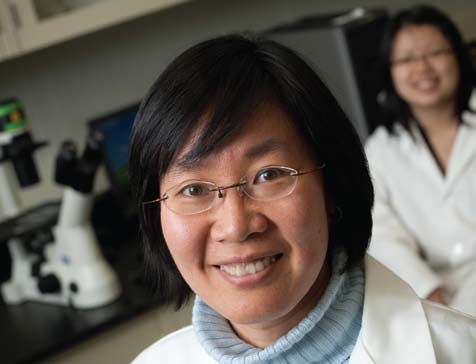More than 90 percent of Africans with HIV are unable to send blood samples to labs to determine the stage of their infection, says Xuanhong Cheng. Even more tragic, she says, is the fact that African babies with HIV-positive parents are not diagnosed.
“HIV diagnosis in adults is simple,” says Cheng, an assistant professor of materials science and engineering. “You take a sample of blood or saliva and put it on a strip. If the strip changes color, you know the adult is infected with HIV and carries an antibody reactive with the strip.
“But infants get a lot of antibodies from the mother. So if a baby has the HIV antibody, the only way to confirm infection is to look for the presence of virus in the blood.”
Monitoring HIV’s progress in an infected adult requires two assays – a CD4 count to detect the extent of damage to the immune system and a viral load to measure the circulating viral concentration. In earlier work, Cheng designed a microchip in a handheld device that measures CD4, a type of white blood cell that defends the body from HIV and other pathogens. This cell counter is under commercial development and awaiting a field test in Africa.
Cheng is now helping to develop a portable device that measures HIV blood concentrations for infant diagnosis and adult HIV monitoring. Currently, this is done by a technician in a clean lab who separates nucleic acid from the blood. A machine then amplifies the HIV-specific sequence and an optical device measures the viral load in the amplified sample.
Cheng wants to capture and immobilize whole particles of the virus in a handheld device, tag the virus with a fluorescent dye, and count HIV particles with an optical detector. She is designing a chip that separates blood cells from the HIV virus and plasma and then concentrates the virus for labeling. Optical techniques designed in collaboration with Daniel Ou-yang, professor of physics, will count the number of labeled particles.
These diagnostic innovations are critical to determining both the stage of infection and the appropriate treatment, says Cheng, who as principal investigator works with Profs. Wojciech Misiolek and William Van Geertruyden of Lehigh’s material science and engineering department, and with Dr. Timothy Friel, vice chair for research and infectious disease specialist at Lehigh Valley Hospital.

